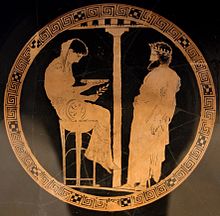Pythia
Pythia ( Greek Πυθία , cf. Python ) was the name for the officiating prophetic priestess in the oracle of Delphi , who announced her prophecies in changed states of consciousness . She sat in the Adyton of the Temple of Apollo on a tripod over a crevice ( χάσμα ). A gas escaping from this gap put the Pythia into a kind of trance . According to Pausanias , it was believed that these gases came from the nearby Kassotis spring , the water of which seeped underground. The prophetic gift was bestowed on her, according to the ideas of the time, through the obsession with God Apollo .
Role as oracle
A pythia was chosen from among the residents of Delphi. Your social status does not seem to have played a role (at least temporarily). The ordination as a priestess took place originally and normally in her youth, after an attack by a Thessalian general named Echekrates, the Delphians are said to have decided to hand over the office to elderly women only. A pythia had to remain virgin.
Cicero remarked in his work De divinatione ( On divination ): “Besides, I think that there were also certain vapors from the earth that penetrated the spirit so that it uttered oracles.” The Greek writer Plutarch testified that once one Pythia died as a result of the ecstasy - probably caused by vapors - with convulsions. The Pythia answered incomprehensibly in its prophetic pronouncements and had to be interpreted by a priest.
Attempts to explain
According to a new thesis of a Greek-Italian research team headed by the Italian geologist Giuseppe Etiope, the oxygen in the relatively small chamber was displaced by otherwise non-toxic gases. The lack of oxygen caused by the Pythia then manifested itself in a kind of drunkenness.
See also
- Kassandra (mythology)
- Sibylle (prophetess)
- Druid
- Risk type (to "Pythia" as designation of a risk type)
literature
- Lisa Maurizio: Anthropology and Spirit Possession: A Reconsideration of the Pythia's Role at Delphi. In: The Journal of Hellenic Studies . Volume 115, 1995, pp. 69-86
- William Smith : Dictionary of Greek and Roman antiquities. Boston and London 1870, pp. 836-839 sv oraculum .
Individual evidence
- ↑ Johannes Irmscher , Renate Johne (Ed.): Lexikon der Antike . 10th edition, Bibliographisches Institut , Leipzig 1990, p. 4764.
- ↑ Strabo 9,3,5
- ↑ a b Diodorus 16:26 .
- ↑ Pausanias 10:24, 8 .
- ↑ Euripides , Ion 92.
- ↑ Michael Maaß : The ancient Delphi . CH Beck, 2007, p. 16 ( limited preview in Google Book Search [accessed March 24, 2020]).
- ↑ Cicero, De divinatione 1,115.
- ↑ Plutarch, De Defectu Oraculorum 51 .
- ↑ Giuseppe Etiope: Natural Gas Seepage: The Earth's Hydrocarbon Degassing. Springer, Cham / Heidelberg / New York et al. 2015, ISBN 978-3-319-14600-3 , pp. 184-186; Dagmar Röhrlich: Sniffing out the future - Oracle of Delphi gives geologists cause for debate . Deutschlandfunk, October 11, 2006


